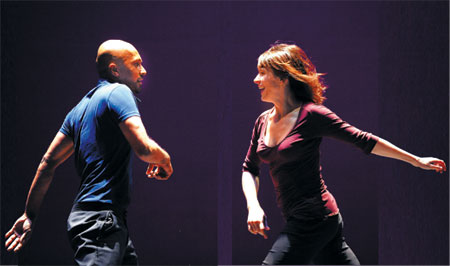 |
|
Juliette Binoche and Akram Khan interpret love in In-i. [File photo]
|
Juliette Binoche opens her heart and reflects on the dance drama that has brought her to China. It has clearly forced her to confront many intensely personal issues.
"Man and woman, Adam and Eve, the big questions about how we dare to love, what is love, how far do we love? Is emotion really love or can we call our needs 'love'? These all came to us," says Binoche of "In-i," her contemporary dance production.
"It feels to me that love is the only way to survive in this world and that love is what life is about. I think I'm more frightened to be loved than to love. It makes me more vulnerable somehow. Because I've been disappointed in some of my relationships, I know that there's something wrong that I need to understand, to face or maybe to surrender to. As a child I felt love was "the biggest" and yet when I felt all my needs coming up as a teenager, and then through my relationships as I was growing up, it suddenly all felt complex, like playing a chess game."
"In-i," the piece co-created, directed and performed by the Oscar-winning actress, has been widely acclaimed since it premiered at London's National Theatre last September.
After touring Europe, US, Canada and Australia, it has finally arrived here and the Frenchwoman says: "Maybe it's coincidence or something mysterious because the project began with a Chinese lady and now we end the tour in China." To help train her body and breathing, Binoche also learned Chinese qigong from a master in London.
Binoche traces the story back to March 2006, when she was filming the movie "Breaking and Entering" in London. One day her masseuse Su-Man Hsu asked her if she wanted to dance. It turned out the Taiwan-born Hsu was the wife of Farooq Chaudhry, a producer for the British-Bangladeshi dancer/choreographer Akram Khan. Binoche was invited to watch Khan's dance "Zero Degree" and met him backstage.
Khan's dance fascinated the actress, who is always willing to explore something new. She went to Khan's studio for a three-day session with him after which the pair decided to do something together, as they knew they had a "connection".
"I wanted to get close to a real artist, sharing something I've never done before," she says. "And Khan was wonderful like that. He is a virtuoso kathak and contemporary dancer and he wanted to explore another part of himself. He was open to having an unknown experience, as I was. I think our common denominator is our fire to go for the new."
Khan recalls: "It was a very intuitive choice. First I was very much attracted by the way she plays her roles in film, the choices she makes. The first film I saw her in was 'The English Patient.' In fact one of my teachers made a piece based on it. I was the Indian boy and my girlfriend played her. And while improvising together, I also discovered her as a creator, how she has her own way to drop into the emotion, to see all the colors."
The beginning was strange, at times awkward and at times very tense between them. At 44, Binoche had never danced before while Khan had no experience in acting. Binoche embarked on an often-painful program of dance training.
"It's been intense. But when you have something in your mind and you want to explore something, age is not a problem," she says. "The energy comes and you can reach another layer of yourself. Also the qigong benefits me a lot. I used to read the Chinese philosophy classics Lao-ztu and Confucius and from them I know people's hearts relate to the spirits and the body tells your emotions. So we started improvising with emotion, and what does emotion do to the body, and how that brings some movement."